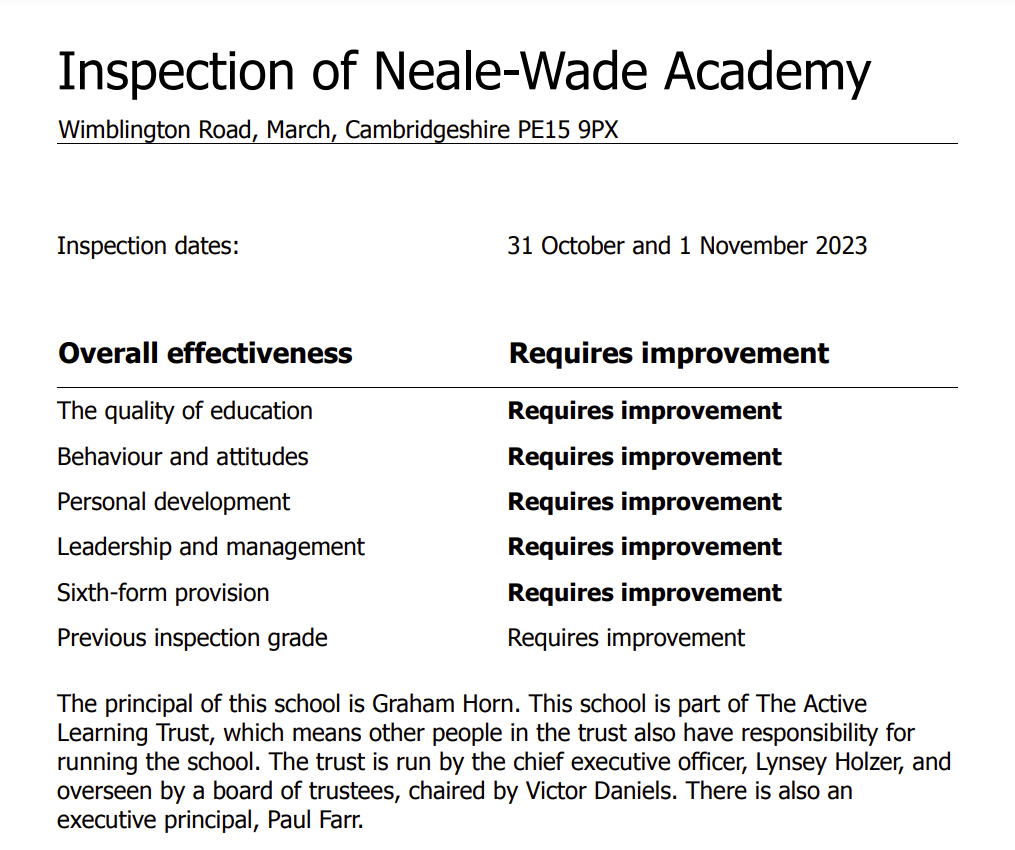A Cambridgeshire secondary school has ignited angry responses from parents after telling them terms such as ‘unwell, poorly, has a cold’ are no longer good enough reasons for a student’s absence. An email sent out to parents of students at the Neale-Wade Academy in March and seen by CambsNews says unless ‘specific detail’ is provided, the school will record such absences as unauthorised.
“Please be advised that from immediate effect we will not be accepting terms such as ‘unwell, poorly, ill’ or similar as explanations relating to student absence,” says the email.

“Communications made using these and similar terms will be recorded as unauthorised.”
The school tells parents they must email or call the school absence line “and give details of symptoms experienced including specific detail advising why this is preventing your child from accessing school.
The email says ‘to help clarify’ reasons that will be recorded as unauthorised are:
Ill
Unwell
Poorly
Period pains (‘unless we have medical information relating’)
Has a cold
….and similar
Parents are livid and many of the 300 responses on the town’s main Facebook group reflect their anger.
“Period Pains with medical evidence?,” says one. “Can a GP diagnose how subjective pain is? Or are they happy to accept ‘has ovaries, therefore ovulates’ as medical evidence enough?”
The parent says she has replied to the school to express “my serious concerns with both the tone and content of the message”.
She adds: “It is clear from your email that you expect parents to provide more detailed explanations when reporting a child’s illness.

“However, this fails to take into account the reality that many parents face in accessing medical care for their children.
“The majority of us are unable to secure same-day doctor appointments or diagnoses, which makes your request for specific symptom descriptions unreasonable.”
“Common terms like ‘unwell’ or ‘poorly’ are often used when parents genuinely do not have a more precise way to describe their child’s condition. Unless the school has a solution for immediate medical access, I fail to see how this policy can be implemented fairly.
“Expecting parents to provide details they might not have is completely out of touch with the current pressures on the NHS.”
One parent quips: “I hope when they have a substitute teacher in we get a full explanation as to why their assigned teacher isn’t in then.
Another wrote, “Jesus ‘period pains’… was this written by a man?”
One parent wrote: “I have emailed them back I think maybe a few of us need to get behind each other here because it is very invasive of any of our children’s medical privacy.
“Even a receptionist at a doctor’s doesn’t need to know as much as they are asking.”
Another post suggested parents “ensure to send in photographic evidence when it’s gastro related, in addition to very high detail about the contents and consistency”.
A handful of parents agreed with the policy change but most remained opposed.
Like this one.
“School seems to think they own my child,” writes the parent. “He was off sick with diarrhoea, and I informed them the day before, their policy is 48 hours so they knew he wouldn’t be in the next day.
“But because I didn’t call in that day they came to my house to ‘find their pupil’ apparently some new government law if it’s an unauthorised absence they have to come find their pupil.
“It’s my bloody child! What a joke”
And one man thought it “very Orwellian isn’t it! I suppose if they are not well due to a family bereavement, they will want the corpse delivered to the school so they can verify the validity of the absence”.

One of the failures of Neale-Wade, says Ofsted, is for ‘behaviour and attitudes” which inspectors observed during their two-day inspection on October 31 and November 1, 2023.
Neale-Wade is facing multiple challenges and its recent Ofsted, in November last year, concluded:
Overall effectiveness: Requires improvement
The quality of education: Requires improvement
Behaviour and attitude: Requires improvement
Personal development: Requires improvement
Leadership and management: Requires improvement
Sixth-form provision: Requires improvement
Previous inspection grade: Requires improvement
The principal is Graham Horn, although the school is part of The Active Learning Trust.
In a statement he said: “At Neale-Wade Academy, we prioritise student well-being and recognise that regular attendance is crucial for academic success.”
Mr Horn pointed to new statutory guidance from the Department for Education and Cambridgeshire Local Authority and as a result Neale Wade is implementing changes to their attendance policies including how student absence is reported to the school.
“These changes include increased support for students at risk of persistent absence and potential legal consequences for unauthorised absences,” the statement explained.
“We appreciate the cooperation of parents and carers as we work together to ensure the best educational outcomes for all our students.”

Picture by Terry Harris.
Cambridgeshire County Council, on their website, points out that “if your child is registered at a school he/she must by law attend that school regularly and punctually.
“Your child should only miss school if he/she is ill or unable to attend for some other unavoidable reason.
“If your child is absent and school either does not receive an explanation from you, or considers the explanation unsatisfactory, it will record your child’s absence as ‘unauthorised’.”


















